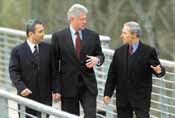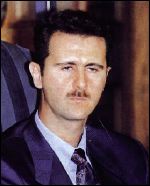 |
| Vol. 2 No. 1 | January 2000 |
 |
| A rare photo-op at Shepherdstown |
Since Clinton administration officials imposed a total news blackout on the talks, journalists flocked to the State Department's briefing room to hear a daily summary of the painstakingly slow pace of the talks. According to the official version of talks, the two stubborn, intransigent negotiators staunchly defended the core interests of their respective countries, but as a result of Clinton's repeated personal interventions, have come to realize the necessity of "painful sacrifices" on "difficult long-standing issues" as they inch their way toward a preliminary agreement.
The problem with this narrative is that it is entirely choreographed for public consumption. According to political sources in Israel, the core framework of a land-for-peace settlement between Israel and Syria peace agreement was negotiated through American diplomatic intermediaries late last year. Although some details of the final settlement have yet to be resolved, officials on all three sides recognize that the major challenge lying before them is selling the agreement to skeptical public audiences in Israel, Syria and the United States.
Barak is faced with two critical domestic political barriers to handing back the Golan--Knesset approval and popular approval in a national referendum. Knesset approval appears now to hinge upon the 17 MKs from the Shas party, who have committed to unanimously support the position of Rabbi Ovadia Yosef, the party's spiritual leader. Although Yosef has not announced a final decision, his recent public statements suggest he is leaning against approval of a withdrawal (he was quoted as calling the Syrian foreign minister "wicked" earlier this month). Moreover, a recent survey by the Institute for Community Studies in Bar Ilan University indicates that 63% of Shas supporters oppose a withdrawal from the Golan.1
Obtaining approval of a land-for-peace settlement in a national referendum will be an even greater hurdle for Barak. The momentum, however, is clearly riding with opponents of a withdrawal. An estimated 150,000 Israelis attended a rally in Tel Aviv on January 10 to protest against the return of the Golan Heights--one of the largest public demonstrations in years. According to a poll conducted earlier this month by the Dahaf Institute, public support for a peace agreement with Syria in exchange for a complete withdrawal from the Golan Heights has eroded from 45% to 41% over the last month, while support for an "almost complete" withdrawal has dropped from 57% to 49%. Around 28% of those polled said that they might change their minds during the course of the negotiations.2
 |
| Bashar Assad |
The Syrian regime has understood from the very beginning that the "Oslo formula" of elaborate public ceremonies in the White House rose garden, photo-ops of the two leaders shaking hands, and close interpersonal contact between the two delegations will not generate public support for a settlement. The Assad regime's reputation, both at home and in the larger Arab world, is too dependent on its unshakable animosity toward the Israelis for this formula to work. Even journalists from Syria were ordered by the government to carefully avoid their Israeli counterparts at Sheperdstown. One Syrian reporter for al-Hayat who refused to be seated at the same table as Jerusalem Post correspondent Janine Zacharia later told American officials that he feared "being arrested" upon his return to Damascus.
Despite some public lamentation about the coldness of the Syrian negotiators by Israeli officials, Barak prefers the current script to the Oslo formula as well. Public displays of affection between Barak and Sharaa are not going to convince his constituents that he is fighting hard to safeguard Israeli security and has extracted the best possible terms. "I don't believe courtesies resolve national interests of the first order," said Barak after the talks.5
Both Barak and Sharaa are well aware that public support for the settlement in their respective countries will not materialize based solely on the perceived merits of the settlement itself. Each requires a massive "peace dividend" from the Clinton administration in order to sell the treaty at home. Not surprisingly, the Israeli and Syrian delegations spent the vast majority of their time at Shepherdstown in separate negotiations with American officials.
Barak must demonstrate to his constituents that the strategic costs of abandoning the Golan Heights are outweighed by the economic and security benefits accruing from an increase in U.S. aid. The Israeli Defense Ministry submitted a $17 billion wish list to American officials that reportedly includes two wings of Apache helicopters, C-130 Hercules transport planes, AWACS, refueling planes, an advanced ground station capable of gathering real-time data directly from U.S. spy satellites, and Tomahawk cruise missiles. For Barak, U.S. aid is not really compensation for returning the Golan to Syria, but is designed primarily to help him win approval for the agreement. Israeli officials have emphasized that the U.S. must officially approve the aid package before the national referendum is held.
State department officials publicly dismissed the request as "too early to discuss." Almost immediately after the talks recessed, however, Sen. Ted Stevens and other senior members of the U.S. Senate Appropriations Committee flew to Israel for a two-day visit and met with Barak to discuss the aid package.
The Clinton administration also plans to provide economic and military aid to Syria as a reward for coming to terms with Israel. "It would be hard to envision a full-fledged peace agreement . . . without Syria and the United States wanting to take steps to improve our relationship as well," said State Department spokesman James Rubin. To the surprise of many, this has been fully endorsed by Israeli officials. "We hope that US aid will influence future Syrian conduct," said a senior Israeli diplomat at Shepherdstown, confirming reports to this effect in the Israeli press.6
Clinton and Barak believe that economic and military assistance to the Assad regime will achieve the following objectives:| | create a dependency on the West that will ensure Syria's continued adherence to the terms of the peace agreement with Israel; |
| | strengthen "moderate elements" in Damascus backing Bashar Assad's succession; |
| | prevent Russian and European arms manufacturers from supplying Syria; |
| | limit the influence of terrorist organizations opposed to the peace process; |
| | isolate Iran and (eventually) pressure it into a detente with the West; |
In short, military and economic support of Syria are seen as the key to a new "Pax Americana" in the Mideast.
U.S. law prohibits economic and military aid to countries on the State Department's list of nations that support terrorism. Removal of Syria from the list is likely to face considerable congressional opposition in the United States, but Barak's endorsement now makes the unthinkable possible (Ankara is less enthusiastic--Turkish officials recently appealed to the U.S. not to remove Syria from the list until Damascus ends its support for the separatist PKK). Three groups of U.S. congressmen are scheduled to visit Syria this month. The London-based Al-Hayat daily newspaper quoted an American diplomatic source in Damascus as saying that the visits were arranged to "facilitate Congress's decision to grant Syria economic aid in the future."7
Ultimately, Congress is likely to act in accordance with public opinion in the United States. Thus, Clinton joins Barak and Sharaa in facing the necessity of selling the agreement to a skeptical domestic constituency. He has his work cut out for him--according to a recent poll, only 21.2% of Americans support granting economic aid to Syria after the signing of an Israeli-Syrian peace accord, while 63.8% are opposed.8
Not surprisingly, both Barak and Sharaa hastened to take credit for the recent postponement of the second round of talks at Shepherdstown in order to boost their appeal at home (each claimed, in effect, that his own refusal to make concessions to the other side led to the disruption). Clinton, meanwhile, has used the delay to refute allegations that American officials are pushing the two sides toward an agreement against their will. While an Syrian-Israeli peace settlement has, in effect, already been negotiated, it's fate hinges upon the outcome of these three great public relations battles taking place in Syria, Israel, and the United States. Meanwhile, the official pace of the peace process will continue to ebb and flow in accordance with the domestic political constraints of the three players.
1 IsraelWire, 10 January 2000. Associates of Rabbi Yosef have said that he may tell Shas Knesset members to "vote their mind and conscience." Ma'ariv, 12 Jan 2000.
2 Yediot Aharanot, 7 January 2000. For more on the domestic political hurdles facing Barak, see "Barak Faces Obstacles in Road to 'Peace' with Assad," Middle East Intelligence Bulletin, December 1999.
3 Yediot Aharanot, 1 December 1999. According to a (questionable) report in the London Sunday Times on January 9, the Mossad obtained a urine sample from Assad when he visited Amman, Jordan for the funeral of King Hussein earlier this year (by implanting a specimen jar in the special restroom provided for his use). "The latest Israeli assessment is that Assad is living on borrowed time," the paper said.
4 BBC Summary of World Broadcasts, Syrian TV, Damascus, 8 January 2000.
5 Ma'ariv, 14 January 2000.
6 "Israel not opposed to US military aid to Syria," AFP, 5 January 2000
7 Al-Hayat, 11 January 2000.
8 Telephone survey of 1000 adult Americans, carried out on 13 January 2000 by John McLaughlin & Associates.